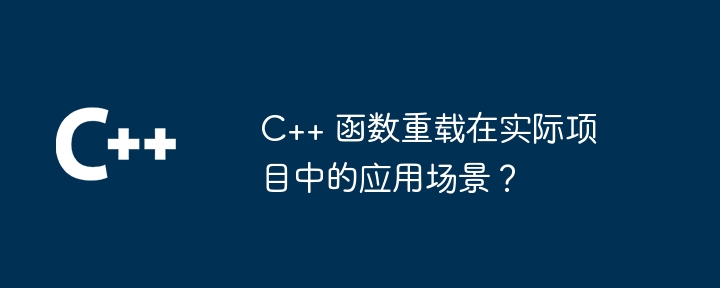Home >Backend Development >C++ >What are the application scenarios of C++ function overloading in actual projects?
What are the application scenarios of C++ function overloading in actual projects?
- WBOYWBOYWBOYWBOYWBOYWBOYWBOYWBOYWBOYWBOYWBOYWBOYWBOriginal
- 2024-04-26 13:57:021218browse
Function overloading allows functions with the same name to be defined differently in C, handle different types of arguments, or perform different operations. Specific application scenarios include: processing different data types to provide different functions to improve code readability

Application scenarios of C function overloading in actual projects
Function overloading is a powerful feature in C that allows functions with the same name to be defined in different ways. This feature is useful especially when you need to handle functions that have different types of arguments or perform different types of operations.
Example:
The following is a practical example using function overloading, which demonstrates how to define different functions with the same name based on the parameter types passed in:
#include <iostream>
using namespace std;
int sum(int a, int b) {
return a + b;
}
double sum(double a, double b) {
return a + b;
}
string sum(const string& a, const string& b) {
return a + b;
}
int main() {
int a = 10;
int b = 20;
cout << "Sum of two integers: " << sum(a, b) << endl;
double c = 10.5;
double d = 20.5;
cout << "Sum of two doubles: " << sum(c, d) << endl;
string e = "Hello";
string f = "World";
cout << "Sum of two strings: " << sum(e, f) << endl;
return 0;
} Output:
Sum of two integers: 30 Sum of two doubles: 31 Sum of two strings: HelloWorld
In this example, we define three sum functions, each of which receives different types of parameters and performs different operate. The compiler will choose the appropriate function to call based on the argument types passed in.
Function overloading is used in many practical projects, including:
- Processing different data types: As shown above, function overloading can be used to process Different types of data such as integers, floating point numbers, and strings.
-
Provide different functions: Function overloading can also be used to implement the same function in different ways. For example, a
sortfunction can have different overloaded versions to sort integers, floating point numbers, or strings. - Improve code readability: By using function overloading, you can create clearer and readable code. By using functions with the same name to perform different types of operations, you reduce duplication in your code and make your code easier to understand.
The above is the detailed content of What are the application scenarios of C++ function overloading in actual projects?. For more information, please follow other related articles on the PHP Chinese website!

